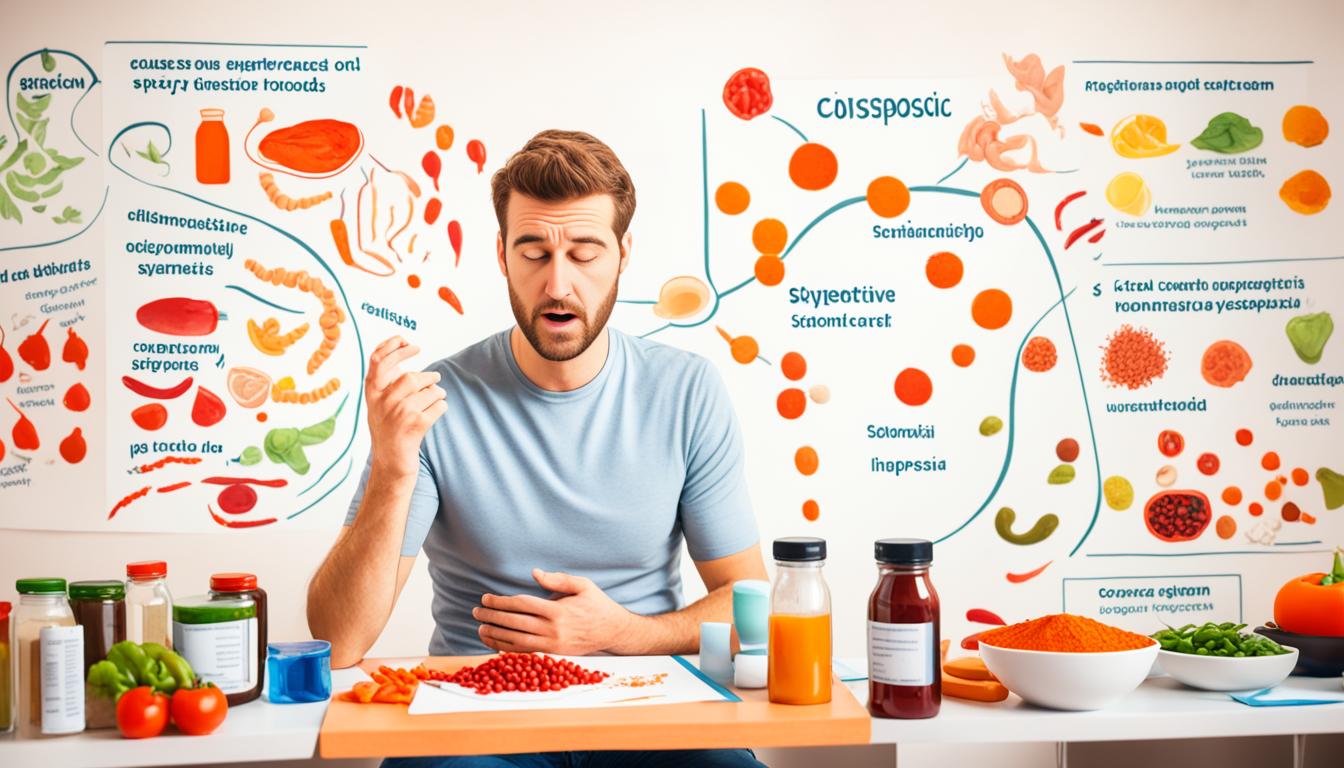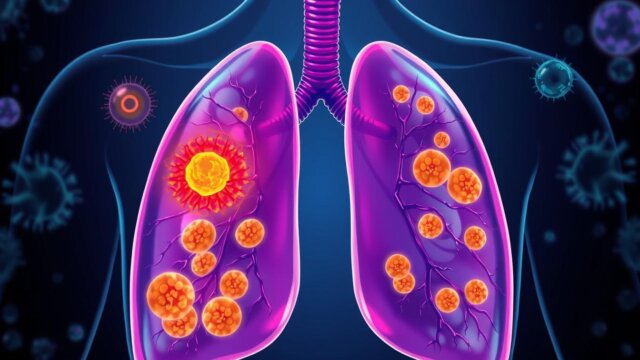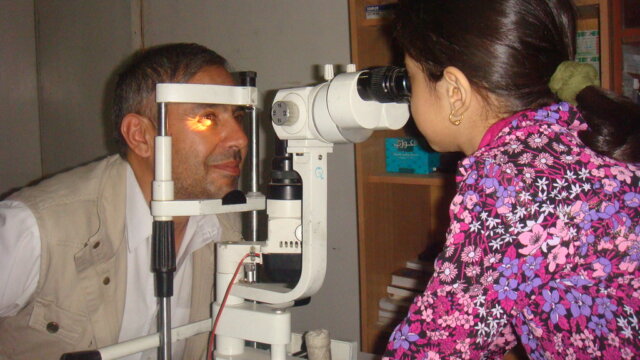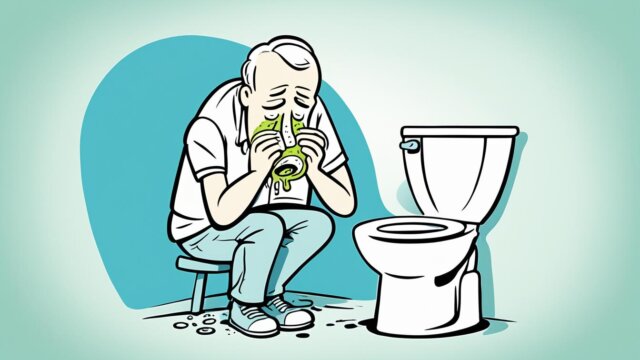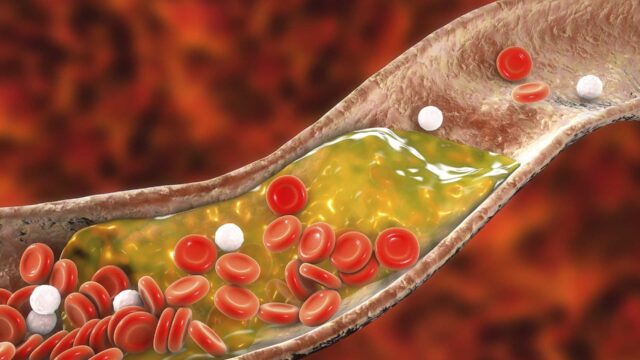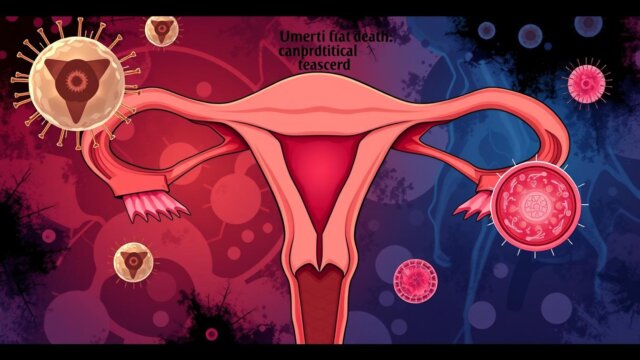FTC disclaimer: This post may contains affiliate links and we will be compensated if you click on a link and make a purchase.
Dyspepsia, also known as indigestion or upset stomach, affects up to 20% of people. It’s a common issue that can cause pain, burning, and discomfort in the upper belly. Sometimes, everyone gets indigestion, but if it happens often for weeks or months, it might mean there’s a health issue.
Indigestion and heartburn are not the same, even though they can happen together. Indigestion brings pain or burning in the upper belly and makes you feel too full too soon or for too long after eating. Heartburn is a type of indigestion that causes a burning feeling in the chest. It can also make your throat and mouth feel sour or bitter.
Key Takeaways
- Dyspepsia, also known as indigestion or upset stomach, is a common digestive disorder affecting up to 20% of the population.
- Indigestion includes symptoms like pain, burning, or discomfort in the upper belly, feeling full too soon while eating, and feeling uncomfortably full after eating.
- Frequent indigestion can be a sign of underlying health problems such as GERD, ulcers, or gallbladder disease.
- Lifestyle changes, dietary modifications, and over-the-counter or prescription medications can help manage dyspepsia symptoms.
- Severe and persistent indigestion may lead to complications like esophageal stricture, pyloric stenosis, and peritonitis, so seeking medical attention is important.
Understanding Dyspepsia
Dyspepsia is another name for indigestion or upset stomach. It’s a set of digestive symptoms that often come together. You might feel pain, burning, or discomfort in your upper belly. You might also feel full too soon or feel uncomfortable after eating.
Heartburn is when you feel a burning in your chest. It can also make your throat and mouth taste sour or bitter. This usually happens because of acid reflux. Indigestion and heartburn are not the same thing, even though they can happen together.
What is Dyspepsia?
Dyspepsia means having ongoing or frequent pain in your upper belly. It’s a common stomach problem that can really affect your life. Symptoms can be mild or severe and include bloating, feeling sick, and feeling too full too soon.
Dyspepsia vs. Heartburn
Dyspepsia and heartburn are not the same thing, even though people often mix them up. Heartburn is caused by stomach acid going back up into your esophagus. This makes your chest burn. Dyspepsia is a wider term that includes many digestive symptoms, like heartburn. Knowing the difference helps you get the right treatment.
“Dyspepsia and heartburn are often used interchangeably, but they are two different problems that may happen at the same time.”
Common Symptoms of Dyspepsia
Dyspepsia, also known as indigestion, is a condition with no clear cause. It often causes an upset stomach. People may feel pain, burning, or discomfort in their upper belly. They might also have bloating, too much belching, nausea, and feeling full too soon.
Bloating and Gas
Bloating and gas are common with dyspepsia. About 40% of those with it feel bloated. Around 50% burp a lot because of it. These issues can come from eating or drinking too fast, or certain foods.
Nausea and Regurgitation
Nausea and regurgitation are also symptoms of dyspepsia. Nausea can happen after eating, and regurgitation means food comes back up. These symptoms can make daily life hard.
If you have serious symptoms like bloody vomit, dark stools, shortness of breath, or unexplained weight loss, see a doctor fast. If your symptoms don’t go away or get worse, see a doctor after two weeks.
Functional dyspepsia is a common type with no clear cause. To manage symptoms, you might need to change your diet, lifestyle, and possibly take medicine.
Causes of Indigestion and Dyspepsia
Indigestion, also known as dyspepsia, can have many causes. Some cases are linked to medical conditions. But, many cases of acid reflux and indigestion come from certain foods.
Food Triggers for Acid Reflux
Foods like fatty and fried dishes, spicy meals, and acidic items like citrus fruits and tomatoes can cause acid reflux. So can alcohol, carbonated drinks, caffeine, chocolate, onions, and peppermint. Avoiding these foods can help ease indigestion symptoms.
Eating too much or too fast can also lead to dyspepsia. This can stretch the stomach and make acid leak out. Foods high in fat make more acids and enzymes, which can irritate the digestive tract.
Smoking, drinking alcohol, and chronic stress can hurt the stomach too. They can cause inflammation and indigestion. Some medicines, like NSAIDs, can also harm the stomach lining if used too much.
Some health issues like peptic ulcer disease, GERD, pancreatitis, and stomach cancer can cause ongoing indigestion. Food intolerances and being overly sensitive to certain foods can also lead to chronic indigestion.
“Functional dyspepsia is more common than any organic cause of indigestion.”
Potential Causes of Dyspepsia | Description |
|---|---|
Dietary Factors | Fatty/fried foods, spicy dishes, acidic foods, alcohol, carbonated drinks, caffeine, chocolate, onions, peppermint |
Lifestyle Factors | Overeating, eating too quickly, smoking, alcohol use, chronic stress |
Medical Conditions | Peptic ulcer disease, GERD, pancreatitis, gallbladder inflammation, stomach cancer |
Other Factors | Food intolerances, visceral hypersensitivity, certain medications (NSAIDs) |
Medical Conditions Linked to Dyspepsia
Dyspepsia, also known as indigestion, can be linked to many medical conditions. Knowing these links helps people manage their symptoms better and find the right treatment.
IBS is a common condition linked to dyspepsia. People with functional dyspepsia (FD) are eight times more likely to have IBS than others. FD also makes people six times more likely to have other digestive issues and 2.5 times more likely to have blood disorders.
GERD can also cause dyspeptic symptoms. Other conditions like peptic ulcers, gastritis, and hiatal hernia are linked to it. Bacterial infections, like Helicobacter pylori (H. pylori), can cause dyspepsia in some people.
Some eating disorders, gallbladder problems, and chronic pancreatitis are also linked to dyspepsia. People with FD are twice as likely to get mental disorders, infections, and parasitic diseases as others.
Dealing with any underlying medical conditions can help ease dyspepsia symptoms. Regular doctor visits can help find the cause and create a treatment plan.
Medical Condition | Link to Dyspepsia |
|---|---|
Irritable Bowel Syndrome (IBS) | Individuals with FD were 8 times more likely to have IBS. |
Gastroesophageal Reflux Disease (GERD) | GERD can contribute to dyspeptic symptoms. |
Peptic Ulcers | Peptic ulcers are associated with dyspepsia. |
Gastritis | Gastritis is a medical condition linked to dyspepsia. |
Hiatal Hernia | Hiatal hernia is a condition associated with dyspepsia. |
Helicobacter pylori (H. pylori) Infection | H. pylori infection can lead to dyspeptic symptoms. |
Eating Disorders | Certain eating disorders have been linked to dyspepsia. |
Gallbladder Issues | Gallbladder problems can contribute to dyspepsia. |
Chronic Pancreatitis | Chronic pancreatitis has been associated with dyspepsia. |
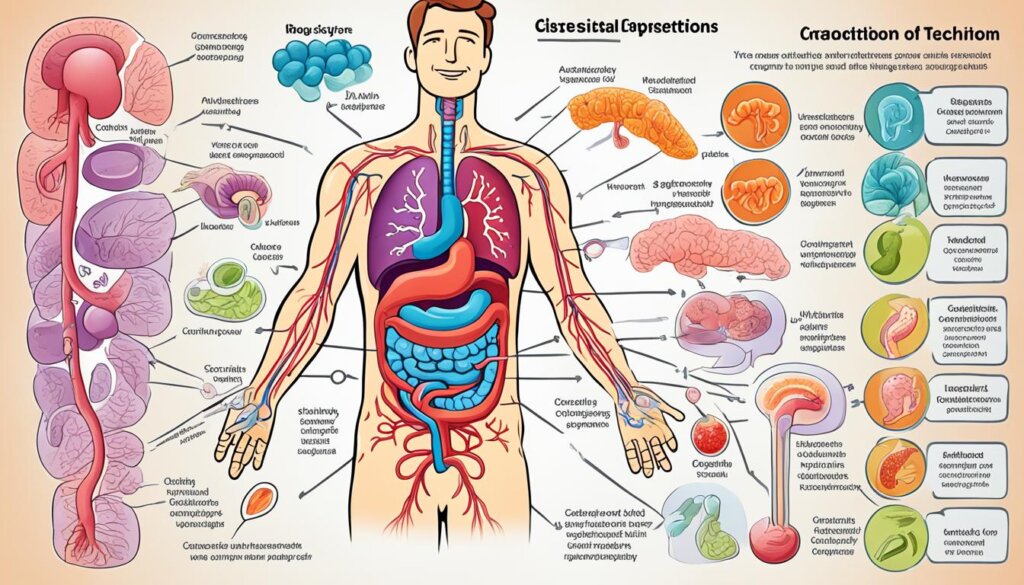
Dyspepsia can have many causes, and finding and treating these conditions is key to managing symptoms. Talking often with a healthcare provider can help figure out the cause and create a treatment plan that fits you.
Medications That May Cause Dyspepsia
Some medicines can lead to dyspepsia, or indigestion. This includes certain antibiotics, bisphosphonates, iron and potassium supplements. Nonsteroidal anti-inflammatory drugs (NSAIDs) and some antidepressants can also cause it. Plus, medications for high blood pressure and heart issues, opioid pain relievers, sedatives, and COPD and asthma drugs might make you feel indigestion.
Knowing which medicines might cause dyspepsia is key. It’s important to talk to a doctor to find out if your meds are making it worse.
Medication Class | Potential Side Effect |
|---|---|
Tetracyclines (Antibiotics) | Heartburn |
Aspirin | Increased stomach acid, less protective prostaglandins |
Calcium Channel Blockers, Beta Blockers | Heartburn |
Bisphosphonates (e.g., Alendronate, Ibandronate, Risedronate) | Heartburn |
Ibuprofen (Motrin, Advil) | Heartburn from more stomach acid |
Iron Supplements | Esophageal irritation, acid reflux |
Potassium Supplements | Esophageal lining irritation |
Benzodiazepines (e.g., Diazepam, Lorazepam) | Relaxing the lower esophageal sphincter, causing heartburn |
Tricyclic Antidepressants (e.g., imipramine, amitriptyline) | Slower stomach emptying, relaxing the LES, more heartburn risk |
It’s important to know how medicines can cause dyspepsia. This helps in managing and preventing this issue.
Dyspepsia During Pregnancy
Many pregnant women feel indigestion and stomach discomfort, especially in the last three months. Hormonal changes and the baby’s growth put pressure on the stomach. This can make the muscles between the stomach and esophagus relax. This lets stomach acid flow back up. Women who had indigestion before or in a past pregnancy are more likely to have it again.
Indigestion starts to happen more from 12 weeks into pregnancy. It gets worse in the last three months. Smoking can make indigestion worse and is bad for the baby’s health, leading to premature birth and other problems. Drinking alcohol can also cause indigestion and harm the baby, so it’s best to avoid it.
Doctors may suggest antacids or alginates for indigestion during pregnancy. Antacids are often used for mild indigestion. But, don’t take antacids too close to taking folic acid or iron supplements.
Hormonal changes, the baby’s growth, and relaxed muscles can make indigestion more common in pregnant women. About half of pregnant women get indigestion. Most pregnant women will have indigestion or heartburn at some point.
If symptoms don’t go away or get worse, see a midwife or GP for help. Omeprazole can be used during pregnancy if other treatments don’t work. Choosing the right medicine is important because some can affect the baby.
Changing your lifestyle can help with indigestion during pregnancy. Heartburn can happen because of hormone changes and the baby pressing on the stomach. As the pregnancy goes on, heartburn gets more common.
Heartburn can be caused by eating big meals, fatty or spicy foods, and other things. To prevent heartburn, eat smaller meals, avoid eating before bedtime, and don’t eat certain foods.
If heartburn doesn’t get better with diet changes and antacids, see a healthcare provider for help.

Diagnosing the Cause of Dyspepsia
Your healthcare provider may suggest several tests to find out why you have dyspepsia. Diagnosing dyspepsia often starts with an upper GI endoscopy. This is when a thin tube with a camera goes down your throat to look at your stomach and small intestine.
Your doctor might also do tests to see if you have Helicobacter pylori (H. pylori). This bacteria can cause stomach ulcers and ongoing indigestion. They use blood, stool, or urea breath tests to check for H. pylori.
Tests for Helicobacter Pylori
Finding H. pylori is key to figuring out your dyspepsia. Blood tests look for antibodies to the bacteria. Stool and urea breath tests directly check for the bacteria. These tests help plan your treatment.
If tests show you have H. pylori, your doctor might suggest treatment to get rid of it. This treatment uses antibiotics and medicines to reduce stomach acid. It works well in about 74% of cases after a year.
Doing thorough tests and getting the right treatment is important. It helps find and fix the cause of your dyspepsia. This way, you get the best care for your condition.
Many people with dyspepsia have serious stomach problems. Dyspepsia costs a lot of money for patients. Feeling anxious and depressed can make symptoms worse. Getting rid of H. pylori helps a lot of people feel better. Herbal remedies and certain medicines work well for dyspepsia. Adding therapy to treatment helps a lot too. Some medicines and treatments really help with dyspepsia symptoms.
About 25 percent of people get dyspepsia every year. It affects 13 to 40 percent of people. Some cases are due to ulcers, reflux, or even cancer.
Lifestyle Changes for Managing Dyspepsia
For many, simple changes can help with dyspepsia symptoms. Avoiding foods like fatty, fried, spicy, and acidic items is key. Also, cut down on caffeine and alcohol.
Eat smaller, more frequent meals, and don’t lie down after eating. Losing weight if you’re overweight can also help.
Creating a calm mealtime setting helps too. Avoid eating when stressed or on the move. These changes can help you manage your dyspepsia better.
Dietary Tips for Preventing Dyspepsia
Here are some diet tips for better digestion:
- Drink 1.5-2 liters of water a day.
- Fill half your plate with veggies at meals.
- Have 1 fruit snack in the morning or afternoon.
- Eat a quarter plate of grains daily, with 4-6 portions a day.
- Limit egg yolks to 3-4 a week, prefer egg whites.
- Have chicken or turkey instead of red meat 1-3 times a week.
- Eat fish and seafood 3-4 times a week.
- Drink 1 low-fat milk or yogurt a day, skip soft cheese.
Avoid fatty foods like fried items and creamy sauces. Choose cooking methods like boiling, baking, grilling, or steaming. Be aware of foods that make your symptoms worse, like chewing gum and citrus juices.
Try healthy snacks like oat biscuits with banana and nuts. Oat tahini biscuits with oat and tahini are also good. Fruits with chocolate and nuts are another good choice.

“Making lifestyle changes, such as adjusting your diet and eating habits, can be an effective way to manage the symptoms of dyspepsia and improve your overall digestive health.”
Statistic | Insights |
|---|---|
Functional dyspepsia is diagnosed in 8 out of 10 cases of indigestion. | Functional dyspepsia is a common cause of indigestion, highlighting the importance of addressing lifestyle factors to manage symptoms. |
Worldwide, 7 out of every 100 people suffer from functional dyspepsia. | Functional dyspepsia affects a significant portion of the global population, underscoring the need for effective management strategies. |
Caffeine-containing foods and drinks, spicy foods, and fatty foods like chocolate can exacerbate symptoms for some individuals with functional dyspepsia. | Avoiding trigger foods is a crucial component of lifestyle changes to manage dyspepsia and functional dyspepsia. |
By making these changes, you can help manage your dyspepsia and improve your digestive health.
Over-the-Counter Treatments for Dyspepsia
Antacids for Indigestion Relief
If you have mild or occasional indigestion, you can try over-the-counter (OTC) treatments like antacids. These medicines help by making your stomach acid-neutral. You can find antacids in products like calcium carbonate (Rolaids, Tums), simethicone (Maalox, Mylanta), and sodium bicarbonate (Alka-Seltzer).
They can help with your dyspepsia symptoms. But, don’t use them more than a few times a week.
For managing dyspepsia, you can also use H2 blockers like famotidine (Pepcid AC). These medicines cut down on stomach acid. Or, you can try proton pump inhibitors (PPIs) that also lower acid levels.
These can give you relief that lasts longer. They’re good for those with more frequent or severe indigestion. This is especially true if you also have acid reflux or heartburn.
Remember, OTC treatments aren’t meant for long-term use. If your symptoms don’t go away or get worse, talk to your healthcare provider. They can help find out what’s causing it and suggest better treatments.
Prescription Medications for Dyspepsia
For severe or ongoing dyspepsia, you might need prescription drugs. These include H2 blockers and proton pump inhibitors (PPIs).
H2 Blockers and Proton Pump Inhibitors
H2 blockers like cimetidine (Tagamet HB) and famotidine (Pepcid) cut down stomach acid production. They’re not as strong as PPIs but help with dyspepsia and acid reflux symptoms.
Proton pump inhibitors work better at lowering stomach acid. Drugs like omeprazole (Prilosec) and esomeprazole (Nexium) help those with chronic or severe dyspepsia.
Both H2 blockers and PPIs need a doctor’s prescription. They’re great for ongoing dyspepsia. But, you should follow your doctor’s advice on dosage and treatment length.

“H2 blockers and PPIs are the most effective prescription medications for managing persistent or severe dyspepsia.”
Remember, while prescription drugs help, don’t forget about lifestyle changes and over-the-counter options. They should be part of your full plan to fight dyspepsia.
Dyspepsia: When to See a Doctor
Most folks get indigestion now and then. It can often be fixed with simple changes in diet and lifestyle or by using over-the-counter meds. But, if you have it a lot, all the time, or it’s really bad, you should see a doctor.
Going to the doctor is a good idea if you have chest pain, lose weight without trying, have trouble swallowing, see blood in your stool, or have really bad stomach pain. Dyspepsia can happen to anyone, and sometimes it can mean something serious like stomach cancer.
If you lose weight without meaning to, can’t swallow well, throw up a lot, see black or tarry poop, or feel a lump in your stomach, get help fast. This could mean you have a serious problem that needs quick attention.
But, if you just have mild indigestion now and then, you can try to fix it by avoiding certain foods, eating smaller meals, and handling stress better. Still, if it doesn’t get better or gets worse, talk to a doctor to figure out what’s going on and get help.
Knowing when to see a doctor can help you take care of your stomach problems early. This can stop bigger issues from happening. Always remember, your doctor is there to help you with this common but serious issue.
Complications of Severe, Untreated Dyspepsia
Dyspepsia, or indigestion, affects over 20% of people. If it gets worse and isn’t treated, it can cause big problems. These include esophageal stricture, pyloric stenosis, and peritonitis.
Esophageal stricture makes swallowing hard because of scarring. Pyloric stenosis narrows the stomach to small intestine passage. This leads to ongoing vomiting and poor nutrient absorption. Peritonitis is an infection that can be deadly if not treated.
These issues might need surgery to fix them. It’s key to get help for ongoing or getting worse indigestion to avoid these problems. In Asia, 5% to 30% of people have chronic indigestion. In the U.S. and other Western countries, it affects 10% to 40% of people.
Women get functional dyspepsia more often than men, because of differences in how their stomachs work. Signs of this include pain or burning in the upper stomach, feeling full too soon, and feeling bloated after eating. If you have these symptoms or other bad stomach problems, see a doctor to find out why and get help.
Dietary Tips for Preventing Dyspepsia
Making smart food choices can help prevent and ease indigestion symptoms. Studies show that eating less fatty, fried, spicy, and acidic foods helps. Also, cutting down on caffeine and alcohol can ease discomfort.
Eating smaller, more frequent meals can also help. Drinking water instead of soda is good too. Noticing which foods upset your stomach and avoiding them can also help manage indigestion.
- Reduce or avoid foods with caffeine as they make stomach acid production go up, making indigestion worse.
- Some foods like pickles, sausages, vinegar, and tea can make indigestion worse.
- But, foods like rice, apple, and honey can help ease indigestion symptoms.
- Watermelon and citrus fruits can also make indigestion worse.
Research also shows that managing stress with counseling or yoga can help with indigestion.
By using these dietary tips and making lifestyle changes, you can prevent and manage indigestion.
“Maintaining a healthy body weight through regular exercise is important for better digestion.”
It’s important to notice what foods upset you and adjust your diet and lifestyle to feel better.
Food Group | Recommended | Limit or Avoid |
|---|---|---|
Grains | White or brown bread, rice, pasta, potatoes | Highly leavened industrial foods, certain whole grains |
Vegetables | Cooked or raw vegetables | Vegetables with fatty sauces or fermented vegetables |
Fruits | Cooked or raw fruit | Citrus fruits, dried fruits, nuts, and seeds |
Dairy | Lactose-free milk, yogurt, hard cheese | Full-fat milk, whipped cream, milkshakes |
Proteins | Meats, poultry, fish, eggs | Processed meats, fatty meats, organs |
Beverages | Water, herbal teas, light barley coffee | Alcohol, carbonated beverages, coffee, citrus juices |
Fats | Olive oil, avocado oil (in moderation) | – |
Following these dietary tips and living a healthy lifestyle can help prevent and manage indigestion symptoms.
Key Takeaways on Dyspepsia
Dyspepsia, or indigestion, affects millions worldwide. It causes chest or stomach pain, heartburn, and more. Foods, medicines, and health issues like acid reflux can cause it.
Managing dyspepsia is possible with some steps. Avoid certain foods and eat smaller meals. Also, cut down on alcohol and tobacco, and manage stress. Medicines like antacids can help too.
But, be careful if you have severe symptoms. Signs like losing weight or having trouble swallowing are serious.
Knowing about dyspepsia helps you take care of your health. If it’s bad or lasts a long time, see a doctor.
Functional dyspepsia affects many people, but often, there’s no clear cause. Heartburn and dyspepsia can be helped by changing your life and taking medicine.
Pregnant women often get GORD-related dyspepsia and heartburn. If you’re over 50, see a doctor quickly if you have it, as it could be serious.
“Living with indigestion typically involves lifestyle changes and possibly medication. Regular exercise and maintaining a healthy weight are recommended.”
Understanding dyspepsia helps you prevent and manage it. Be careful for signs of serious health issues that need quick medical help.
Conclusion
Dyspepsia, or indigestion, affects about one in five Americans. It can come from many disorders. Up to 60% of people with chronic dyspepsia don’t have a clear cause. Still, some medical issues and medicines can cause it too.
There’s good news. Many people get better with diet changes, over-the-counter meds, and sometimes prescription drugs. If symptoms are bad or last a long time, see a doctor. They can help if your symptoms get worse or don’t get better.
In short, you can manage your digestive health and reduce indigestion and dyspepsia. Be proactive and get medical help when you need it. This way, you can keep your digestive health in check and feel better overall.
FAQ
What is dyspepsia?
Dyspepsia is a group of digestive symptoms. These include pain, burning, or discomfort in the upper belly. It also includes feeling full too soon or for too long after eating.
How is dyspepsia different from heartburn?
Indigestion and heartburn are often used together. But they are different problems. Indigestion includes burning or pain in the upper belly and feeling full too soon or for too long.
Heartburn is a burning feeling in the middle of the chest. It also includes a sour or bitter taste in the throat and mouth. This is usually caused by acid reflux.
What are the common symptoms of dyspepsia?
Common symptoms include bloating and gas. These can be caused by swallowing too much air when eating or drinking. Nausea and regurgitation, where food comes back up into your esophagus, can also be symptoms.
What can cause dyspepsia?
Dyspepsia can be caused by certain foods. These include fatty and fried foods, spicy foods, and acidic foods like citrus fruits and tomatoes. Alcohol, fizzy drinks, caffeine, chocolate, onions, and peppermint can also cause it.
What medical conditions are linked to dyspepsia?
Several medical conditions are linked to dyspepsia. These include irritable bowel syndrome (IBS), gastroesophageal reflux disease (GERD), peptic ulcers, and gastritis. Hiatal hernia, bacterial stomach infections, eating disorders, gallbladder issues, and chronic pancreatitis can also be linked.
Can medications cause dyspepsia?
Yes, some medications can cause dyspepsia. These include antibiotics, bisphosphonates, iron supplements, and potassium supplements. NSAIDs, anticholinergics, tricyclic antidepressants, and some blood pressure and heart disease medications can also cause it.
Opioid pain relievers, sedatives, and medications for COPD and asthma may also cause indigestion as a side effect.
Can dyspepsia occur during pregnancy?
Yes, indigestion and dyspepsia are common during pregnancy. This is especially true in the last trimester. Hormonal changes and the growing baby pressing against the stomach can cause it.
How is the cause of dyspepsia diagnosed?
To diagnose dyspepsia, healthcare providers may perform tests. These include an upper gastrointestinal (GI) endoscopy to examine the esophagus, stomach, and duodenum. Tests to check for Helicobacter pylori (H. pylori) infection may also be done.
What lifestyle changes can help manage dyspepsia?
Recommendations include avoiding or limiting trigger foods like fatty, fried, spicy, and acidic items. Caffeine and alcohol should also be limited. Eating smaller, more frequent meals can help.
Avoiding lying down after eating and losing weight if overweight can also provide relief. Making mealtimes a relaxed occasion and avoiding eating while stressed or on the go may also help reduce indigestion.
What over-the-counter treatments are available for dyspepsia?
For mild or occasional indigestion, over-the-counter (OTC) treatments like antacids can help. Antacids work by neutralizing stomach acid. They include products like calcium carbonate (Rolaids, Tums), simethicone (Maalox, Mylanta), and sodium bicarbonate (Alka-Seltzer).
Antacids can provide quick relief but should not be used more than a few times per week. Other OTC options include H2 blockers like famotidine (Pepcid AC) and proton pump inhibitors (PPIs) that reduce stomach acid production.
When are prescription medications needed for dyspepsia?
For more severe or persistent dyspepsia, prescription medications may be needed. These include H2 blockers like cimetidine (Tagamet HB) and famotidine (Pepcid). They reduce stomach acid production.
Proton pump inhibitors (PPIs) like omeprazole (Prilosec) and esomeprazole (Nexium) are even more effective at lowering acid levels.
When should you see a doctor for dyspepsia?
If you have frequent, persistent, or severe dyspepsia symptoms, you should see a doctor. Signs that warrant a doctor’s visit include chest pain, unexplained weight loss, difficulty swallowing, blood in the stool, and severe, constant abdominal pain.
What are the potential complications of severe, untreated dyspepsia?
In rare cases, severe and untreated dyspepsia can lead to complications. These include esophageal stricture (scarring and narrowing of the esophagus), pyloric stenosis (narrowing of the passage between the stomach and small intestine), and peritonitis (infection of the lining of the digestive system).
What dietary tips can help prevent dyspepsia?
Tips include limiting intake of trigger foods like fatty, fried, spicy, and acidic items. Caffeine and alcohol should also be limited. A healthy, balanced diet can help.
Eating smaller and more frequent meals can also provide relief. Drinking water instead of sodas can help stay hydrated and prevent dyspepsia.
